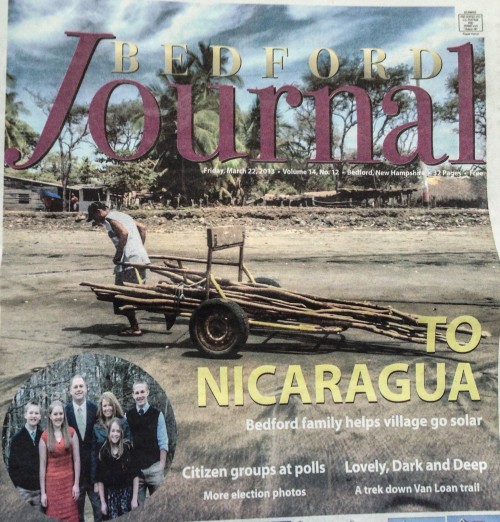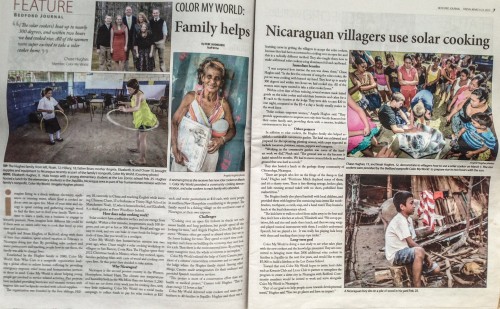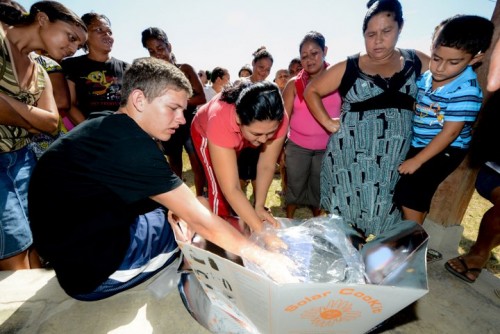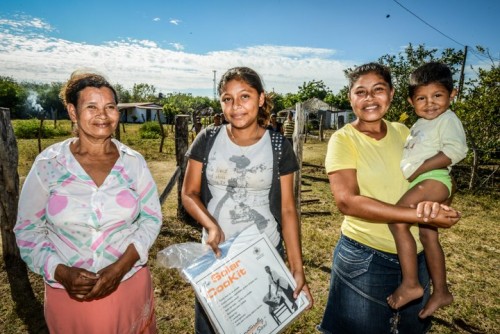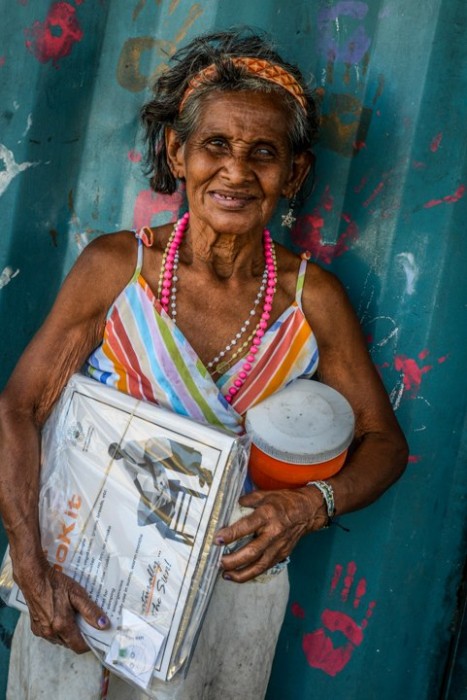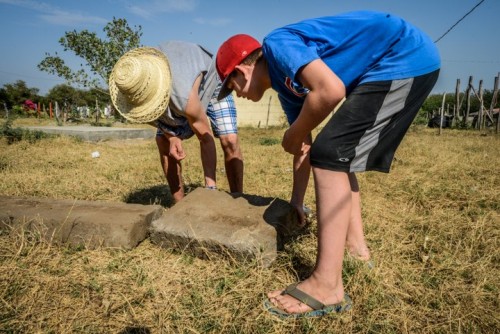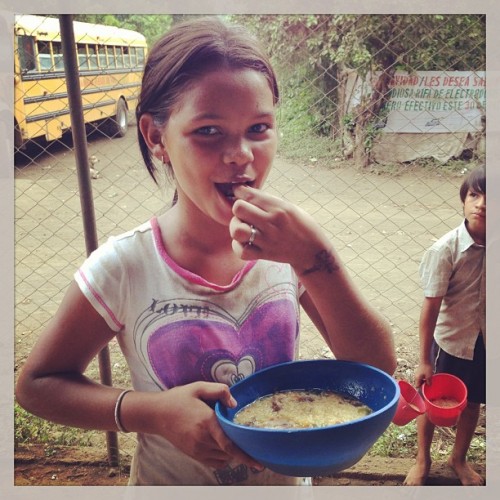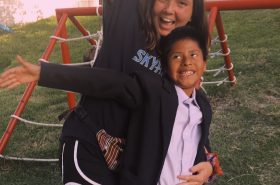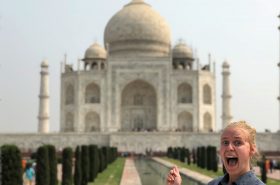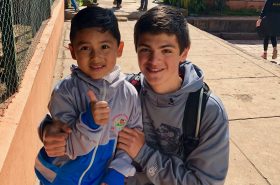Bedford family helps Nicaraguan villagers use solar cooking
By IRENE LABOMBARDE
Staff Writer
Imagine living in a shack without electricity, appliances or running water, where food is cooked indoors over an open fire. Most of your time and energy is spent cutting and gathering enough wood to fuel the fires just to feed your family. There is no time to learn a trade, run a business or engage in leisurely pursuits. Now, imagine how different life could be if there were an easier, safer way to cook that freed up your time and resources.
Angela and Brian Hughes, of Bedford, along with three of their four children, spent school vacation in February in Nicaragua doing just that. By providing solar cookers and water pasteurizers and teaching people how to use them, the family was able to change lives.
Established by the Hughes family in 2000, Color My World: Kids Who Care is a nonprofit organization leading a global effort to relieve human suffering by providing emergency response relief items and humanitarian services to those in need. Color My World is about helping young people get involved in service-related activities. Past projects have included providing hurricane and tsunami victims with hygiene kits and backpacks stocked with school supplies.
The organization was founded by the four siblings, Hillary, 18, currently in China and teaching English while learning Chinese; Chase, 15 a freshman at Trinity High School in Manchester; Noah, 12, who is homeschooled, and Elizabeth, 9, a third-grader at Peter Woodbury School.
How does solar cooking work?
Solar cookers have a reflective surface and use energy from sunlight. Within a few minutes, temperatures reach 100 degrees, and can get as hot as 300 degrees. Bread and eggs are easy to cook, and you can bake or roast foods for longer periods of time, like you would in a crockpot.
Color My World’s first humanitarian mission was two years ago, when Chase taught a solar cooking workshop to villagers in San Ramon, Costa Rica. The Hughes spent their 2012 Christmas break in Mexico, where they noticed, again, families pedaling bikes with carts of wood and cooking over open fires. At this point they decided to take action.
Why Nicaragua?
Nicaragua is the second poorest country in the Western Hemisphere, behind Haiti. The climate sees temperatures and humidity both in the 90s. More than one hectare (1,200) of trees are cut down every week just for cooking fires, with very little replanting. Color My World ran a social media campaign to collect funds to pay for solar cookers at $25 each, and water pasteurizers at $10 each, with many people in southern New Hampshire contributing to the project. The family stayed in a fishing village on the northwest coast of Nicaragua, at their own expense.
Challenges
“Cooking over an open fire indoors in shacks not only causes health and lung problems, but people spend all day looking for trees,” said Angela Hughes, Color My World director. “Women often get raped or abused when they are in the forest looking for trees. They spend so much time cooking they can’t focus on building the economy, they can’t look for a job. Then there is the environmental issue. By cutting so many mangrove trees, the whole ecosystem is incomplete.”
Color My World enlisted the help of Gerry Caseres, president of a citizens’ conservation committee and co-owner of the lodge where the Hughes family stayed. Among other things, Caseres made arrangements for their audience and provided Spanish translation services.
“This project is more of a conservation effort than any health or medical project,” Caseres told Hughes. “This is clean energy 12 hours a day.”
Color My World delivered solar cookers and water pasteurizers to 40 families in Jiquillio. Hughes said there was a learning curve in getting the villagers to accept the solar cookers, because they had been accustomed to cooking over an open fire, and this is a radically different method. They also taught them how to make additional solar cookers using aluminum foil and cardboard.
Immediate benefits
“I was surprised how intense the sun was down there,” Chase Hughes said. “In the first five minutes of using the solar cooker, the pot we were cooking with burned my hand. They heat up to nearly 300 degrees and within two hours we had cooked rice. All of the women were super excited to take a solar cooker home.”
Within a few days of their training, several women made baked goods on the solar cooker and sold their brownies and cakes for a $1 each to the tourists at the lodge. They were able to earn $20 in one night, compared to the $1-4 a day a family usually makes in the work force.
“Solar cookers empower women,” Angela Hughes said. “They provide opportunities to improve not only their family finances but their entire family unit, providing them with a smarter, healthier environment to live in.”
Other projects
In addition to solar cookers, the Hughes family also helped establish a sustainable community garden. The land was cultivated and prepared for the upcoming planting season, with crops expected to include tomatoes, potatoes, onions, peppers and mangoes.
“Working in the community garden was some of the hardest work we did,” Noah said. “The ground was so dry because it hadn’t rained for months. We had to move cement blocks and weed ground that was hard as a rock.”
They also hosted a lunch at the garbage dump community of Chinandega, Nicaragua.
“There are people who live on the fringe of the dump to find food,” Hughes said. “Hurricane Mitch displaced many of them, and it’s a shanty town. There is free-flowing sewage, broken glass, and kids running around naked with no shoes, potbellied from malnutrition.”
The Hughes family also played baseball with local children, and provided them with hygiene kits containing basic items like toothbrushes, toothpaste, a comb, soap, and a hand towel. They hosted a lunch at the local elementary school.
“The kids have to walk to school from miles away in the heat and they don’t have a kitchen at school,” Elizabeth said. “We cut up potatoes, fish and rice and made them lunch, and then we sang songs and played musical instruments with them. I couldn’t understand Spanish, but we played a lot. It was really fun playing hula hoop with them and teaching them jump rope tricks.”
Long-term goal
Color My World is doing a case study to see what takes place with the new cookers and the knowledge presented. They are committed to bringing more than 2000 additional solar cookers to families in Jiquillio in the next few years, and would like to raise $5,000 to build a kitchen at the Los Zorros School.
Toward that end, Color My World hopes to invite local clubs such as Kiwanis Club and Lions Club to partner to strengthen the program to create a sister city in Nicaragua with Bedford. Community members would be invited to work and serve alongside Color My World in Nicaragua.
“Part of our goal is to help people move towards developmental travel,” Hughes said. “You can go places and have an impact.”

